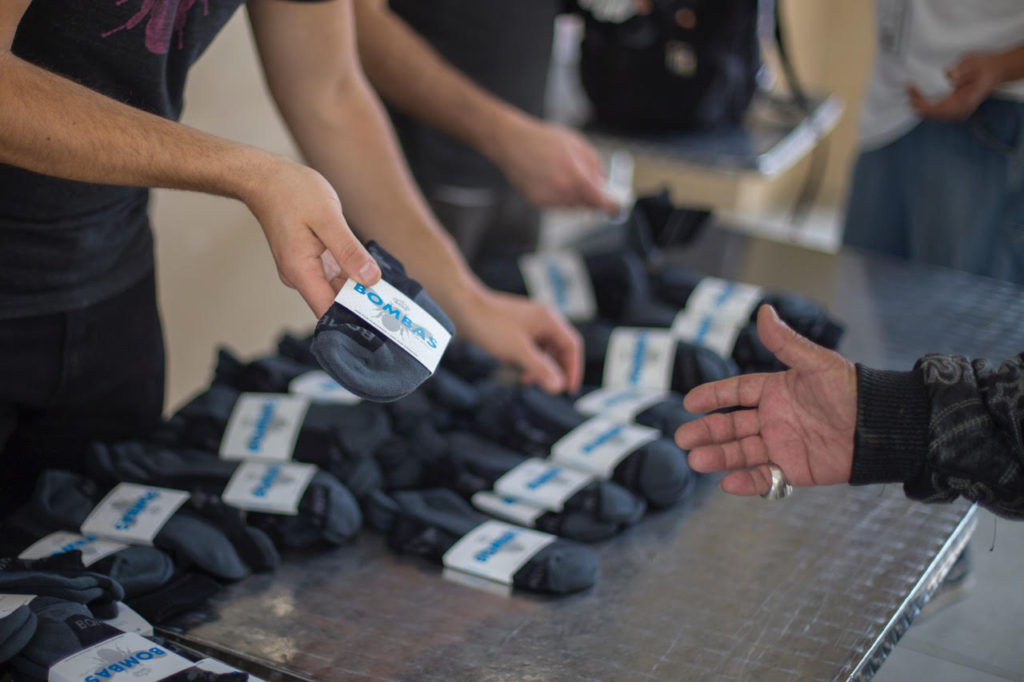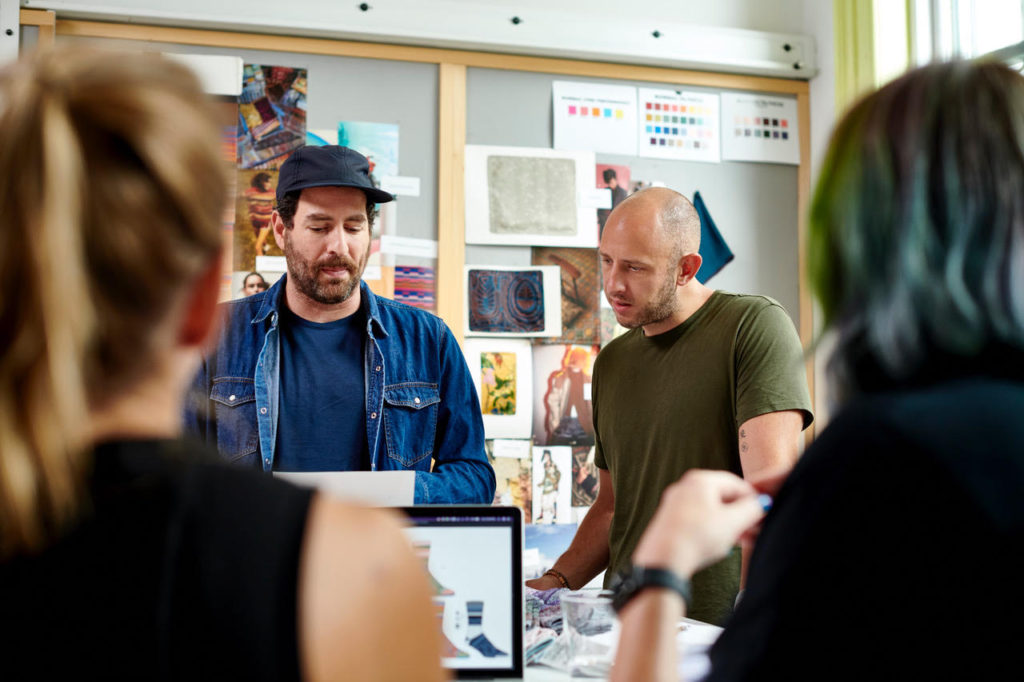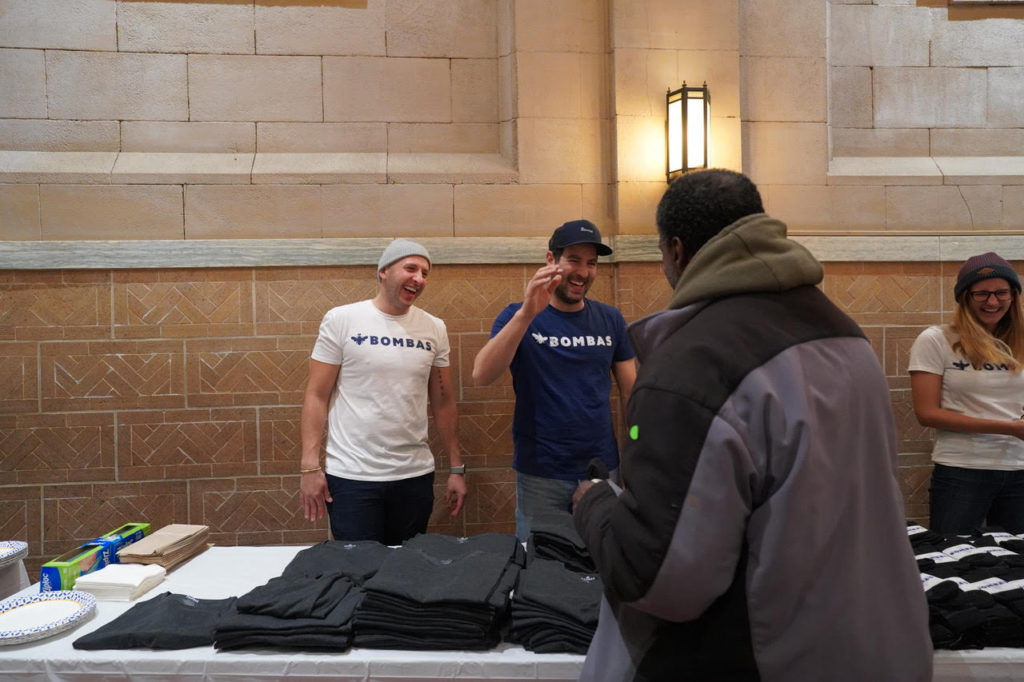
Today’s corporate leaders realize that purpose is essential to starting and growing a business. That said, purpose alone won’t make your business successful. It is the integration of impact, quality products, customer service and meaningful storytelling that allows brands to gain a competitive advantage.
A company doing exemplary work marrying purpose and product is Bombas. The direct to consumer apparel brand donates a pair of socks for every pair they sell.
“Socks are the number one most requested clothing item at homeless shelters,” David Heath, co-founder and CEO of Bombas, tells We First. “It’s a luxury item for over 640,000 people who experience homelessness in the U.S. annually.”
In the past year, Bombas donated more than 40 million pairs of socks and shows no sign of slowing down. How do they do it? How did they turn an idea into a multimillion dollar social enterprise?
Founding story:
Heath learned about how important socks were to homeless people in 2011. “I started giving out socks to homeless people on my way to and from work in New York City,” Heath says. “I saw one guy take his shoes off and on one foot he had wrapped a bandana around his foot and on the other, he’d literally wrapped his foot into a plastic bag to stop the boot from rubbing against it.”
People living on the street often keep their shoes on at night for fear that they might be stolen. Not having access to socks presents health risks for homeless people. Since socks are a wear-through item, there’s a lack of them at donation centers. “How can I solve this problem at scale?” Heath wondered.
The young founder graduated from Babson College’s business school and his father was an entrepreneur. “I was always exercising my entrepreneurial muscle,” he says. “My eyes and ears were constantly looking for problems to solve utilizing business. I saw companies like TOMS and Warby Parker doing the 1-for-1 model and said, ‘Maybe I can create a company where we donate socks.’”
Heath had the idea in February, 2011 but Bombas didn’t open publicly until August, 2013. “When you’re a one person show in the early days with no cash or resources, and the only time you have to work on it is from 6:00 PM until midnight and on weekends, you have to grind it out,” the co-founder says. “There’s no such thing as an overnight success. I had to focus on refining the product, the brand, the story and the mission,” Heath recalls.
The name Bombas came from Heath’s partner Aaron Wolk and “is derived from the Latin word for bumblebee bees. They’re small animals that work together as a hive to make their world better. Socks are a small item but can have a big impact on someone’s life.”
To authentically act on purpose he recommends that founders and employees get close to the issue they are addressing. In the beginning, David would go out and listen to people’s stories, which invoked a sense of empathy inside him. Prior to learning about the individual circumstances, a lot of people think that homeless people are at fault for getting themself into that unfortunate position and that it could never happen to them, David explains.
“I remember this one guy who was in a car accident with his entire family and he was the sole survivor. He became incredibly depressed, as most people would, then turned to alcohol and eventually drugs, ” Bombas co-founder says. “I have so many experiences that continue to motivate me.”
Today, Bombas requires all new hires to take 10 pairs of socks and hand them out to homeless people they meet within the first 2 weeks on the job. “It helps them feel motivated and personally connected to the mission,” Heath says.
In addition to diving into social issues, Heath conducted extensive product research. “Our goal was to create the most comfortable socks in the history of feet.” In addition to online research, he did a lot of networking. David gained insight from meetups, charity events and gatherings. Heath was looking to “talk to people in the fashion industry or people who had experience sourcing and manufacturing and figure out how you get connected to factories.” he explains. “Most people thought I was crazy.”
From an early age Heath practiced, “the art of not giving an F.” While it was intense holding a job and starting the company, David’s entrepreneurial spirit kept him from burning out. “The process was so exciting. I was learning something. The drive to solve those problems in real time motivated me.”
Before he started Bombas, Heath was, “blindly focused on trying to make as much money as possible. This business showed me that the true gift and purpose in life is to give back. Our mission is the main driver of our success today.”
Raising Capital:
While doing the research, building a network and defining your brand identity is essential, it takes money to start most businesses. Heath watched other online retailers fall short of investor expectations. For example, Fab.com went bankrupt and Gilt Group sold for a fraction of what its last valuation was. “Before I raised a single dollar of capital, I wanted to go out and prove market validation,” the pragmatist says.
Heath invested $18,000 of his own money to develop a minimum viable product (MVP). He and his team launched an Indiegogo campaign for which they created a video explaining how they would donate socks to homeless people and developed comfort-based improvements. Within the first day, they’d secured $30,000. After 30 days of the campaign, they reached $150,000. Some of that money went to purchasing the first product run, some of it went to building a website.
“My next question was, ‘Once I get these products on everyone’s feet, are they going to love it enough to come back? Are they going to tell their friends about it without us having to raise money for marketing?’” Heath recalls.

By the end of 2013, Bombas had reached $400,000 in sales. David finally felt comfortable seeking outside funding and raised $1 million in seed financing from private investors.
“I didn’t want any venture capital funding because eventually I want it to be focused on profitability. In the venture world that’s like a bad word. The venture firms want to mark up their books and if they can give you more funding or higher evaluation that allows them to go raise more capital.”
Balancing priorities of product and purpose:
“The two pillars of our company are a high quality product and a great mission,” Bombas co-founder says. “ I don’t believe you can build a successful brand on a mission alone. You have to have a good product.”
After extensive research, David found a gap in the market. There are low cost, bulk products like “a 12-pack of Hanes socks for $10 at Costco.” Then there are niche socks for hiking, running, cycling and other sports. Heath began noting features in the performance models like “a seamless tower arch support, a cushioned foot bed, ventilation over the toes, stay put cuffs and moisture and temperature regulating fabrics.” He began wearing these specialized products and noticed that the “features translated into a more comfortable pair of socks to even wear casually.”
“I took these features and benefits and leveraged a design that I thought was more approachable,” Heath shares. “It was a mix between modern and vintage. That’s how I came up with the original Bombas sock.”
Company surveys revealed that consumers prioritize either product or mission depending on the marketing messages they’re exposed to. When Bombas does a campaign about hitting a donation milestone, customers prioritize the giveback. After releasing a performance line and putting out related media, consumers value quality over purpose. “It’s a different emphasis at different times of year,” Heath says. “We’re trying to find the push-pull balance depending on what is culturally relevant.”
A great example of a time when purpose was more significant than product was when COVID-19 first hit. Bombas has built a network of around 3,500 giving partners across the country. Cleaning companies, bed linen companies and others reached out to them asking for advice on how to get product donations to the people that need them most. Their impact channels became a platform for other companies trying to make a difference.
Bombas focused all of their email communication at that time on giving. “We saw some of the highest open rates and engagement from those emails, because they were cutting through the noise.
Partners don’t always seek purpose. In fact, some companies reached out to Bombas about co-branding products and asked if they could get a discount if they didn’t donate a pair with every one sold. While they would have provided welcome capital, especially during the early days, Bombas refused. “This is what our brand is built on,” Heath declares. “If that doesn’t align with you, then we’re going to have to walk away.”
David says that the donation doesn’t actually require the company to substantially increase its margins. By utilizing the direct to consumer model they’re able to cut out the middle man. They keep costs down by limiting sizes and making larger orders.
“Our thought is, ‘Let’s take a slightly lower margin if that translates into more sales,” the co-founder explains. “Plus, once new categories get up to scale, we’ll drive down the costs of the product and hopefully increase our margins.”
Growing pains:
Bombas has experienced rapid growth and overarching success; however, there have been bumps in the road that tested the company.
About half of the brand’s revenue comes during the end of year holiday season. In 2018, Bombas underestimated their growth in revenue by around 50 percent. Due to the unexpected surge in orders, their warehouse was around a week behind. People started flooding customer service with questions about where their socks were.
“We started getting people posting online, saying, ‘Bombas is stealing our money. They’re out of business. They’re not responding to us. They haven’t shipped my order.’ Then Business Insider did an article about it. It was a nightmare.” Heath says. At that point, there were 14,000 people that had complained to customer service.
To do damage control, Bombas sent out a blanket email saying that they were going to refund everyone’s order, give them a gift card for the same amount and hope that they come back. “It costs us three and a half million dollars,” Heath says. “However, the cohort data for the customers who received that refund had almost two times higher lifetime value than the cohort who had a normal experience in Q4 that year.” The lesson here is that crises provide an opportunity to double down on consumer relationships.
Impact-driven aspirations:
As Bombas grows, so does its impact and aspirations. Socks are a valuable offering for homeless people, yet, are they really changing lives?
“Having a good pair of socks on your feet hopefully translated into you feeling valued and dignified,” Heath says. “It’s not having to necessarily go out and buy those unnecessary items that then we can start to create change.”
Bombas discovered that their donations create extra time and money for charities. “One of our giving partners in North Carolina said that in the four years we’ve given them socks they’ve been able to save enough money to send two kids from their community to college.” The partnerships and ripple effects scale impact.
The company also scales impact and builds community by hosting events and supporting team members to volunteer. Last year they donated over 10,000 volunteer hours and hosted roughly 15 giving events per month with local partners in New York.

Bombas is also looking for new ways to give back, like getting involved in policy, opening homeless shelters and expanding into new product categories. “We’re setting out to create the first ever consumer brand for the homeless community,” Heath says.
Recently, Bombas added pima cotton T-shirts that they describe as, “the first shirt that you want to wear out of the wash.” Next on the list is underwear, “which is the second most requested item at homeless shelters; T-shirts are third,” Heath shares. While the company is expanding, they plan to stay “laser focused” on comfort-based basics for the next several years, building on their mission and bottom line.
Key lessons from David Heath for entrepreneurs on how to gain competitive advantage:
Heath’s journey and Bombas’ success offers valuable lessons for entrepreneurs looking to scale impact and profits.
- Practice empathy: For seven years, Bombas has been ranked as one of the best places to work and only seven people have left during that time. “I thrive on making other people happy,” Heath says. “I’m an empathetic leader and forgo opportunities to raise my own salary if it means an incremental pay raise to an employee that’s been working hard or if I could hire a new person to expand the business.” Ultimately, hustle hard, make your customers happy and support your team.
- Keep it simple: When starting a new venture, no one knows who you are or what you stand for. You could have the best product in the world with the most impactful contribution but if consumers don’t understand it then you’ll be stuck in the mud.
“Do whatever you can to make your brand and product as simple as possible to help the consumer understand what your mission is,” Heath recommends. “This will help them buy into it, and be an advocate for you.” Make it authentic, straightforward and sticky.
- Stay grounded: While success may reward you with riches and clout, it’s critical to stay humble and close to your team, your customers and your giving community. “Stay grounded by continuing to get close to it and volunteer your time,” Heath says. “Tell the real stories behind it, things that people can connect to and go home, then share with their friends and family over dinner.” Not only will this help engage your customers, it will also help you attract and retain top talent that’s motivated by the same things you are.

